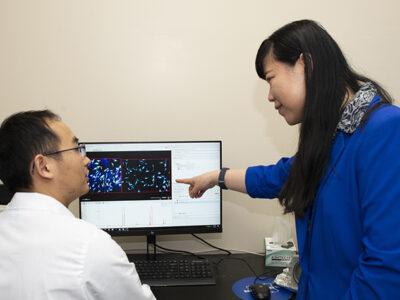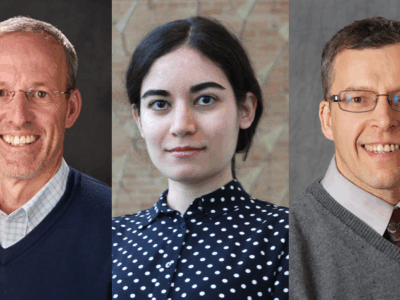
11
December

These recent School of Pharmacy graduates are shaping the future, one innovation at a time
By Jessica Steinhoff
The third annual Five of the Future feature explores the exceptional achievements of recent alumni from the University of Wisconsin–Madison School of Pharmacy’s five degree programs: Bachelor of Science in Pharmacology and Toxicology (PharmTox), Doctor of Pharmacy (PharmD), Master of Science in Health System Pharmacy Administration, PhD in Health Services Research in Pharmacy (HSRP), and MS or PhD in Pharmaceutical Sciences (PharmSci).
This year’s quintet includes a Harvard postdoc shaping the future of leukemia treatment, a World Health Organization consultant passionate about destigmatizing disability, a health-outcomes researcher at Butler University, a consulting-firm leader who transformed UW Health’s bottom line, and an entrepreneur leveraging the power of data science in personalized medicine and beyond.
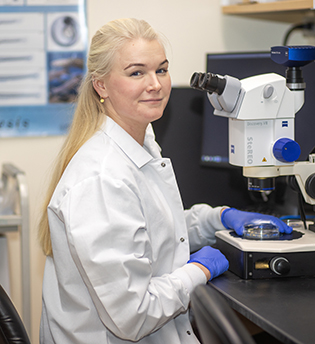
Location: Boston, Mass.
Position/Employer: Postdoctoral fellow at Harvard Medical School and Boston Children’s Hospital
Claim to Fame: Stem-cell research to yield new treatments for leukemia, lymphoma, and myeloma
Proudest moment: Helping develop a toxicology curriculum for decision-makers in Sierra Leone
Inspiration: A thirst for knowledge and an appetite for helping others
Morgan Walcheck (BS ’16) is constantly asking why. It’s part of what makes her a great scientist. She traces this curiosity back to high school, when she started asking lots of what, when, and how questions.
“I remember wondering about trash: When you throw it away, where does it go and what happens next?” she says.
Walcheck entered UW–Madison’s PharmTox program with plans to become a pharmacist, and then she discovered other ways of using a pharmacy degree through the Undergraduate Research Scholars (URS) program.
“I fell in love with the research process, the lab environment, and the kinds of questions we get to think about there.”
—Morgan Walcheck
“I fell in love with the research process, the lab environment, and the kinds of questions we get to think about there,” she says. “Soon I realized the career for me is working at the research level in pharmacology and toxicology.”
Her first URS experience took place in a plant biology lab, which helped her realize she wanted to study human biology. To do so, she took a position in the lab of Richard Peterson, professor in the School of Pharmacy’s Pharmaceutical Sciences Division, studying how the industrial byproduct TCDD (2,3,7,8-Tetrachlorodibenzo-p-dioxin) influences prostate cancer development.
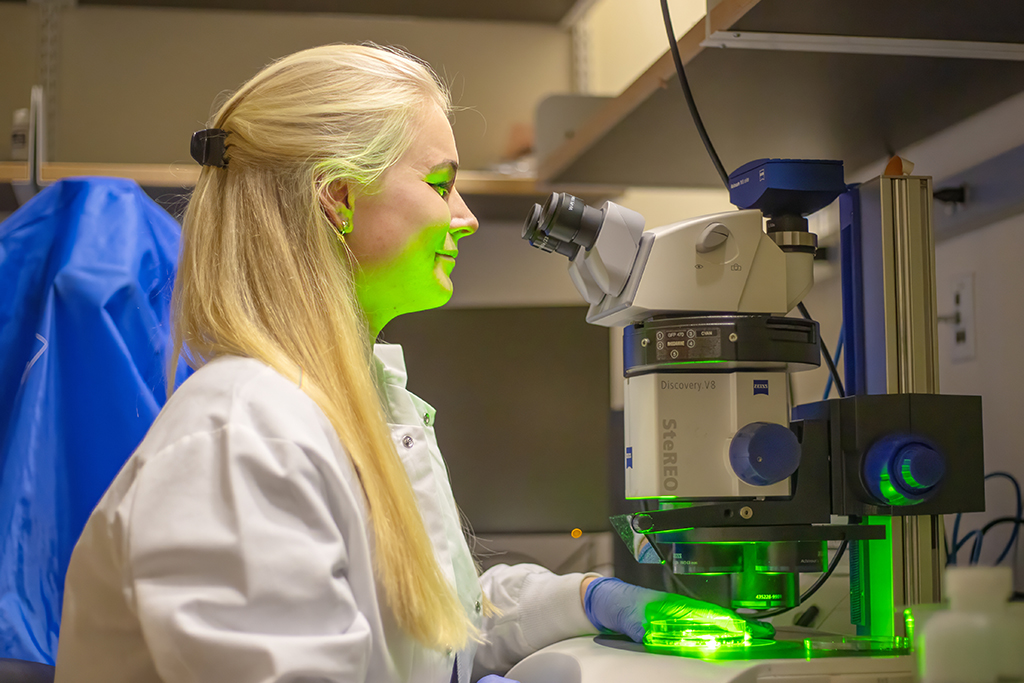
“This dioxin has a structure our bodies can’t handle, so it irregulates our systems in ways that promote immune issues and cancers,” she says. “Not even the environment can break it down.”
Around the same time, Walcheck deepened her knowledge about environmental contaminants’ social and economic impact through a certificate program at the Nelson Institute for Environmental Studies. By graduation, she was well-prepared for UW–Madison’s PhD program in molecular and environmental toxicology, which she completed in 2021. For her doctoral research, Walcheck brought her interest in contaminants and cancers to the lab of Sean Ronnekliev-Kelly, a surgical oncology professor who studies pancreatic tumors.
“I studied a receptor that functions like a 911 call center, binding to chemicals it flags as hazardous, like dioxins or cigarette smoke, and telling the liver or metabolic enzymes to clear them out,” she says. “We made a mouse model to see what happens in pancreatic cancer when this receptor isn’t working. The first thing we noticed was leukemia, lots of it developing quickly.”
Another highlight of Walcheck’s grad-student years involved Project 1808, a nonprofit that assists community development in Sierra Leone by raising the quality of public education. Pathobiology research fellow Alhaji N’jai founded the organization in 2009, during his postdoc at the UW. In 2018, after learning of Sierra Leone’s astounding volume of environmental toxins and the public health crisis that has resulted, Walcheck and helped to develop a curriculum to impart toxicology principles to Sierra Leone college students.
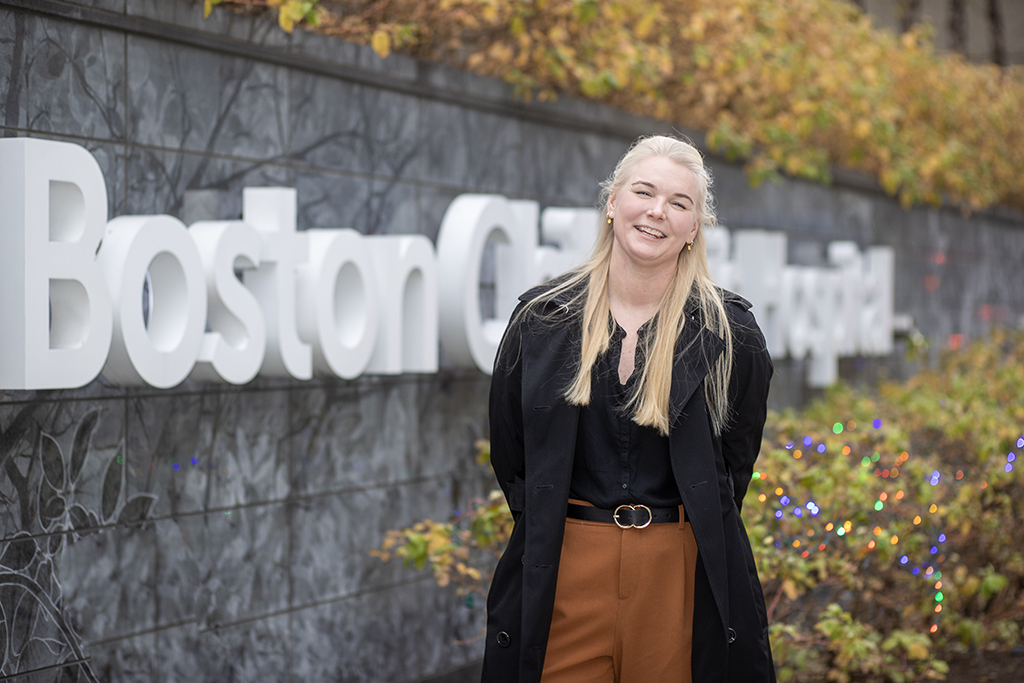
The lecture Walcheck developed centers on metabolism, introducing enzymes that expel the harmful parts of substances that enter the body and showing how the body produces toxic substances when metabolizing certain compounds. After a successful run with college students, the curriculum was turned into a certificate program for learners in government and industry roles.
“One idea is that the toxicology principles they learn can help them make more informed decisions about problems involving environmental toxins, like chemical spills,” Walcheck says.
Since 2022 Walcheck has applied her expertise in the lab of Harvard’s Trista North, whose stem-cell research sets the stage for new ways of tackling blood and liver diseases. Walcheck’s team studies inflammation’s impact on hematopoietic stem cells to revolutionize the treatment of leukemia and other blood cancers. She hopes to gain the experience and acumen needed to become a principal investigator (PI) at a prominent research institution like UW–Madison.
“I love the research I do as a postdoctoral fellow, and I probably get to do it for another four or five years if I’m working toward becoming a PI,” she says.
Back to top
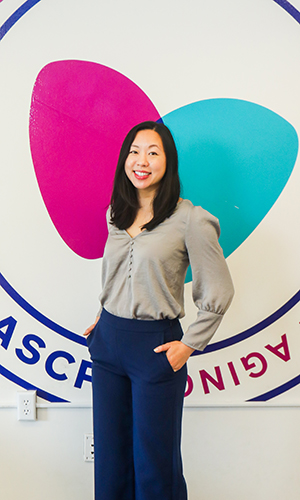
Location: Alexandria, Va.
Position/Employer: Director of Data Strategy and Innovation at the American Society of Consultant Pharmacists, consultant for the World Health Organization, founder and Executive Director of The Mind Reset, principal of Wocus Health, LLC
Claim to Fame: Using data science and geographic information systems to improve global public health and address inequities in the American health care system
Proudest Moment: Earning a PharmD and a master’s in public health four years after a major traumatic brain injury, despite the many co-morbid conditions and challenges that accompany TBI healing such as panic attacks, migraines, and moments of self-doubt
Inspiration: “Everyone deserves to enjoy life and have a health care system that works for them. That’s not the case for so many people with disabilities and other marginalized identities, and I want to help change that.”
Jing Wu (PharmD ’17) can’t remember most of her early formative experiences, so she’s creating new ones. They range from building a compassion-centric social movement, to teaching humanitarian workers about geographic information systems (GIS), to consulting with organizations like Pfizer.
Wu has lifetime retrograde amnesia from severe traumatic brain injury she suffered in 2013, shortly after earning her bachelor’s degree at UW–Madison.
“My life basically ended in my early 20s, when I woke up in a neurological ICU unable to walk, smell, taste, feel emotion or hear very well,” she says. “TBI is extremely stigmatized and challenging, but I seem to be one of the few people who has figured out how to manage my version of brain injury complicated by memory loss.”
The stigma is one reason she founded The MindReset, an online community dedicated to making society more supportive, inclusive, compassionate, and kind. It’s also a forum for reflection, gratitude, and empowerment for the community that supported her as she learned to adapt to her limitations and embrace a new self-identity. Understanding the power of social and emotional support for sustained healing, the community offers individuals the opportunity to explore their patient identities in a psychologically safe environment.
“All I want in my life is for everyone I love to know that I cared, and that I tried my best to make the world a better, kinder place, which ultimately is something we will achieve together.”
—Jing Wu
Wu uses The MindReset’s blog to remember important life moments and share tools for functioning in a world where certain abilities are assumed, challenging those assumptions along the way. Above all, she aims to create a sense of belonging for others who feel they don’t belong anywhere, noting how her own journey has involved “making an incredible amount of mistakes, experiencing an uncomfortable amount of frustration, and pushing through a lot of mental barriers, especially pain and self-defeat.”
This commitment to helping marginalized people thrive extends to her work in the pharmacy world, where she’s developing an ethnogeriatric pharmacy fellowship at the American Society of Consultant Pharmacists (ASCP).
“The fellowship’s focus is caring for older adults with culture in mind, marrying soft skills, such as communication and trust-building, with clinical skills and cultural sensitivity,” says Wu. It grew out of a sense that she herself needed more knowledge about caring for aging people when her own parent with an immigrant background experienced isolation during COVID-19.
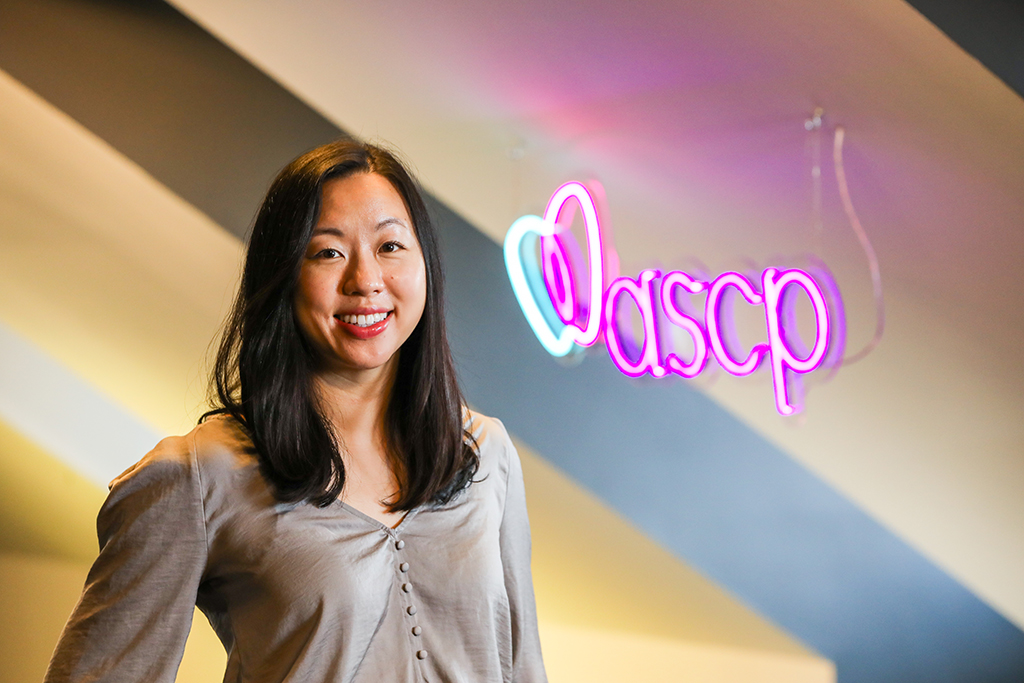
Wu’s main job at ASCP concerns data and analytics. Her expertise in this area shapes the organization’s decision-making, communication initiatives, external and internal collaborations, and research efforts. ASCP and its desire to explore data strategy attracted Wu with a commitment to innovation and opportunities to advocate for marginalized patients and pharmacists alike. In her first year at the organization, she spearheaded efforts at a national level to advance justice, equity, diversity, and inclusion for older adults and complex patients as the staff liaison on these subjects.
“I think it’s worthwhile to consider health in the context of social justice and call out how pharmacists are some of the most marginalized health care providers,” says Wu. who also holds a master’s degree in public health, “I say this because many pharmacists are not able to exercise the full extent of our clinical expertise nor get reimbursed for the value we provide.”
She likens pharmacists to the ‘goalies’ of the patient journey, as they ensure safe medication use before the patient goes home with their treatment.
“Because of that role, we tend to be risk-averse, so I can imagine it took a lot for my retail pharmacist peers to expose the poor working conditions at some of the big chains,” she says. “My job at ASCP allows me to be part of conversations and projects that influence the profession at varying levels of scale and is one way I can use my talents to help people who don’t have as much power or privilege.”
Whenever possible Wu seizes opportunities to make the American health care system work better for people facing multiple barriers. Through her World Health Organization consulting role, she gains valuable insights from other countries’ health leaders.
“Health is at the forefront of other cultures, and those societies tend to be healthier and happier, so I learn as much as I can about them,” she says.
In turn Wu works with her team to train health organizations across the globe on how geospatial data — and GIS tools that analyze and interpret it — can take their work to another level. For instance, such data can help decision-makers determine where a disease exists, how certain health issues are related to the environment, and where different populations go for health care. It’s especially useful during military conflict and natural disasters, allowing aid workers and medicine to reach injured people’s location as fast as possible.

Wu gained many of her geospatial-data skills at Esri, the software company behind ArcGIS, where she worked from 2019 to 2022. Her “just figure it out” attitude deserves credit, too.
“During one rotation with the World Health Organization through the School of Pharmacy, I was tasked with mapping trauma mortality patients, so I taught myself ArcGIS,” she says.
This came in handy after graduation, when Wu met Esri’s chief medical officer and was inspired by the opportunity to conduct interprofessional public health work through the lens of technology underneath a woman executive leader. She realized she could build a bridge between health care and GIS technology, a career path she hadn’t considered.
Today GIS is her bridge to the rest of the world, providing a broader context that gives her hope.
“Problems like having to wait months to see a specialist you’re supposed to see right away is a frustrating reality in the US, but I try to stay focused on the bigger picture,” she says. “Thankfully, working for a global humanitarian organization helps me feel less disillusioned and helps me remember that there are many different contexts and paths to a better, healthier society. As a TBI survivor, a condition inherently tied to pain and suffering, I find it remains true to this day, even after 10 years, that the path out of pain is human. It has been the positive influence of my community that taught me how to live and gave me the purpose for why. All I want in my life is for everyone I love to know that I cared, and that I tried my best to make the world a better, kinder place, which ultimately is something we will achieve together.”
Back to top

Location: Indianapolis, Ind.
Position/Employer: Assistant Professor of Pharmacy Practice at Butler University
Claim to Fame: Health economics and outcomes research comparing treatments for cardiovascular, diabetes, COVID-19, and more
Proudest Moment: “I as a principal investigator of a $100K grant designed a cost effectiveness model to compare ready-to-administer opioid products to the traditional vial methods for an inpatient setting in the US. It’s a source of pride and an important piece of professional growth for my work as HEOR scientist.”
Inspiration: “The U.S. health care system excels at pioneering the development of innovative treatments and conducting cutting-edge research, but access to healthcare remains constrained and excessively costly. Helping to find ways of lowering the costs without compromising the quality of healthcare is important to me.”
Some families gravitate toward a particular line of work. For Prachi Arora’s (PhD ’17) family, it’s pharmacy.
“I grew up in India, surrounded by pharmacists who provided me with motivation to try this field,” she says. “Deciding which area of pharmacy to pursue at the PhD level, that took a little longer.”
Over time she found herself drawn to health outcomes research and policy questions, plus she discovered she enjoys statistics. The UW–Madison School of Pharmacy’s Health Services Research in Pharmacy program was an excellent fit.
Designing comparative effectiveness research and generating real-world evidence is one of Arora’s specialties. Much of her work has involved analyzing health care resource utilization, costs and prescribing trends for conditions including cardiovascular diseases, diabetes, and COVID-19. Helping streamline clinical practice, improving access to care and expanding coverage are the main goals of her work. For example, Arora points to her recent comparison of four direct oral anticoagulants (DOACs) using Medicare prescription claims data.
“I see myself as less of a teacher and more of a facilitator who can guide the students as they critically evaluate things within and around us.”
—Prachi Arora
“To see how these anticoagulants can be used more effectively by the patients and have better Medicare coverage, I did a head-to-head comparison of the drugs and evaluated patient utilization outcomes for each drug,” she says.
Arora compared the rates of medication adherence, persistence, discontinuation, and switching between the DOACs for Medicare patients with non-valvular atrial fibrillation or venous thromboembolism. Her study found that of all the DOACs, apixaban had the highest adherence rate and lowest switching rate, yet it wasn’t covered by Medicare plans most favorably. She published an article about the study in Research in Social and Administrative Pharmacy in 2023.
Though findings like these are valuable for incorporating patient’s utilization outcomes into the prescribing practices, Arora also hopes to see Medicare plans’ coverage decisions reflect this knowledge.
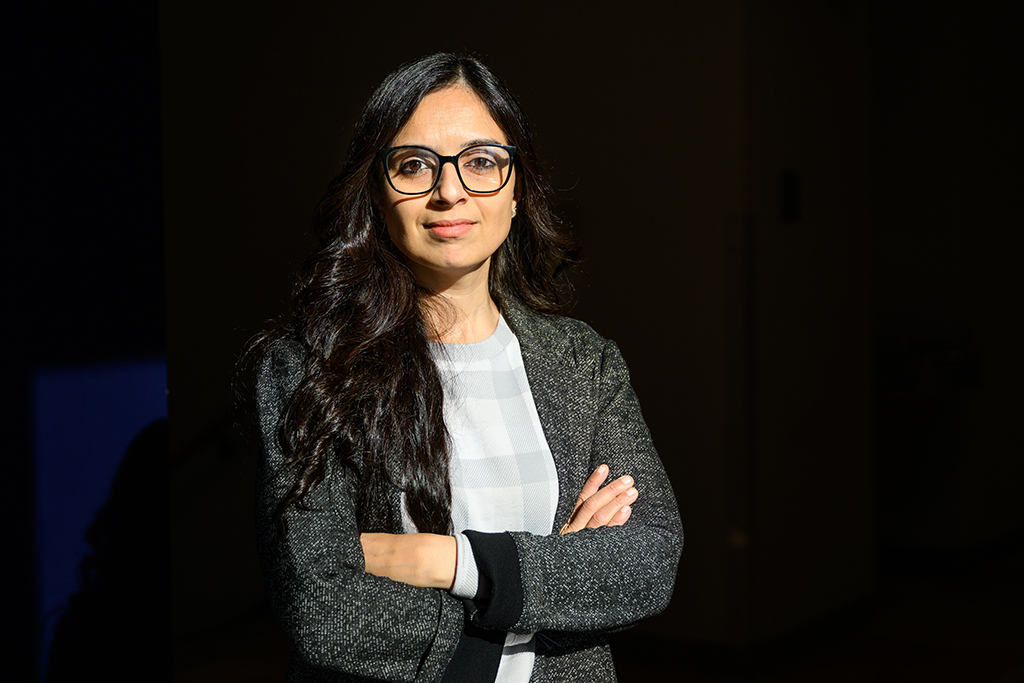
Internships at AbbVie and Boehringer Ingelheim gave Arora her first taste of how research gets translated outside of academia.
“Whether we were doing a observational study or a systematic literature review, I was able to see how different study designs fit into the real world,” she says.
Arora’s research on anticoagulants grew out of her Boehringer experience, and forging relationships with stakeholders and colleagues across the organization prepared her for life beyond grad school.
“It gave me deeper insight into how decisions are made across various teams, such as how research is developed and designed to position a drug in the market,” she explains.
Arora also uses these relational skills with her PharmD students. She wants them to be independent thinkers who are motivated to help their patients thrive.
“I try to find a link between what I’m teaching and what I’m researching because it helps students relate to the course material,” she says. “Also, I encourage students to read and critique my work.”
Arora teaches courses on health economics and outcomes, and statistics and research methods, both of which dovetail with her research. She also explores the Affordable Care Act (ACA), another favorite research topic, in courses on health care reform. So far, her ACA research has investigated how expansions of the act’s health care coverage benefited young adults and women.
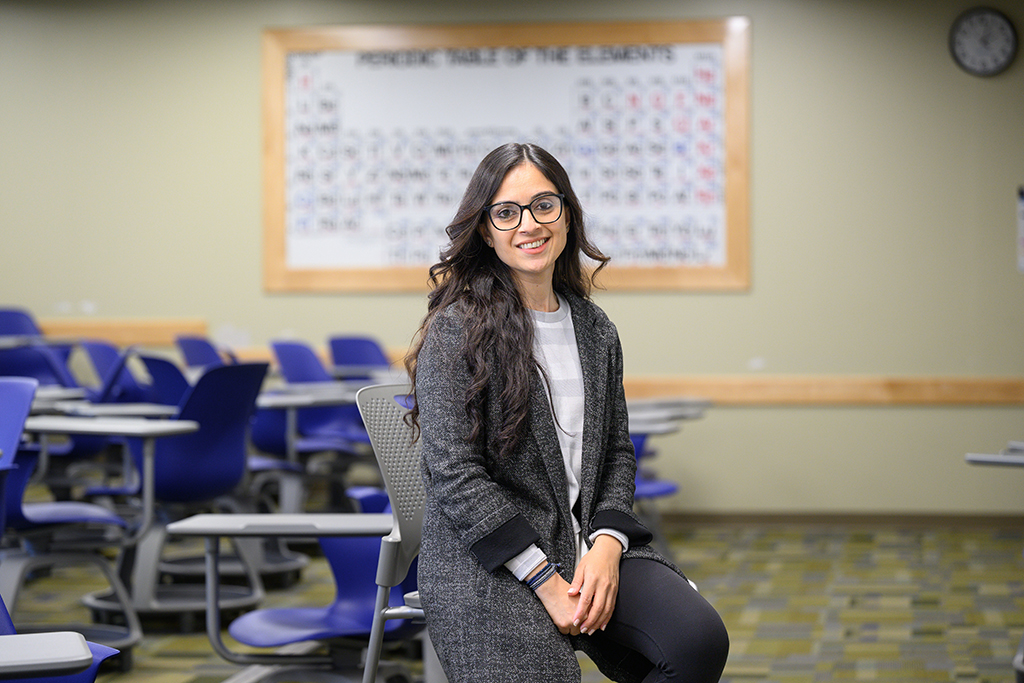
When relevant, Arora shows her students other research she’s done, including systematic reviews, meta-analyses and retrospective studies related to oncology and cardiovascular therapies.
“I see myself as less of a teacher and more of a facilitator who can guide the students as they critically evaluate things within and around us,” she says.
This mindset also shapes her volunteer work at Girls Inc., a nonprofit that gives girls skills for navigating economic and social barriers in their careers and beyond. Cultivating independent minds is an integral part of the job. Arora assists an outreach program that introduces girls to STEM fields, but science, technology, engineering and math aren’t all they discuss.
“One module we did was about choosing a role model, which led us to talk about gender equality,” she says. “I’m fortunate that my parents supported my interest in STEM, and I want other girls to have that opportunity.”
Back to top

Location: Grand Rapids, Mich.
Position/Employer: Chief Technology Officer and data scientist at Betterbin, founder and Chief Executive Officer of MadCity Analytics
Claim to Fame: Developing a “smart toilet” that can provide real-time information about a person’s health, including sleep, exercise, and medication use
Proudest Moment: Becoming a founder and a freelancer
Inspiration: Wife and fellow scientist Lauren, plus a drive to solve problems related to human health and environmental conservation
Flexibility and adaptability are two of Ian Miller’s (PhD ’18) superpowers. Living abroad has helped him recognize them and use them for good.
“When I was a kid, my family and I lived in Strasbourg, France, for two years,” he says. “We moved around a lot, and it shapes how I think about the world.”
Miller has also lived in China several times, thanks to his interest in Mandarin and cultural exchange. During his undergrad years, he studied the language at two Chinese colleges: Capital Normal University and the Harbin Institute of Technology. He returned to China in the summer of 2014, after his first year of graduate school, through a Department of Education fellowship. Miller enhanced his scientific Mandarin skills by meeting with scientists in Nanjing and Jinan, discussing infectious disease research with government officials at the Jiangsu Provincial Center for Disease Control, and giving a presentation at Tsinghua University in Beijing.
Though Miller has invested much time in language learning and even helped Chinese health officials translate research findings into English, he doesn’t just think of himself as The Scientific Mandarin Guy.
“In my last job, taxonomy-building was a bridge between data science and biology; in this job, it’s a bridge between data science and consumer packaged goods.”
—Ian Miller
“I think living in many different places has made me comfortable with having a somewhat fluid identity,” he explains. “People often get stuck thinking of themselves as one thing. I try to follow the things that interest me most.”
Professionally, these things include data science, computational biology, and entrepreneurship. His interest in data science developed in Associate Professor Jason Kwan’s lab in the School of Pharmacy’s Pharmaceutical Sciences Division. There, while earning his PhD, he focused on bioinformatics and data analysis.
“I was interested in how microbes make druglike compounds and knew Jason’s group was working in that area,” Miller says. “He’s interested in the symbiotic relationships microbes have with certain types of hosts, like marine invertebrates. They’re analogous to those happening in our guts and affecting our health.”
Miller analyzed microbiome datasets and extracted biochemical insights from them, which helped him build a foundation for his own scholarly work. After graduation, he took his data science skills to a different domain: mass spectrometry. Until 2021, Miller led informatics and software efforts for the National Institutes of Health’s National Center for Quantitative Biology of Complex Systems, part of UW–Madison Chemistry and Biochemistry Professor Josh Coon’s lab.
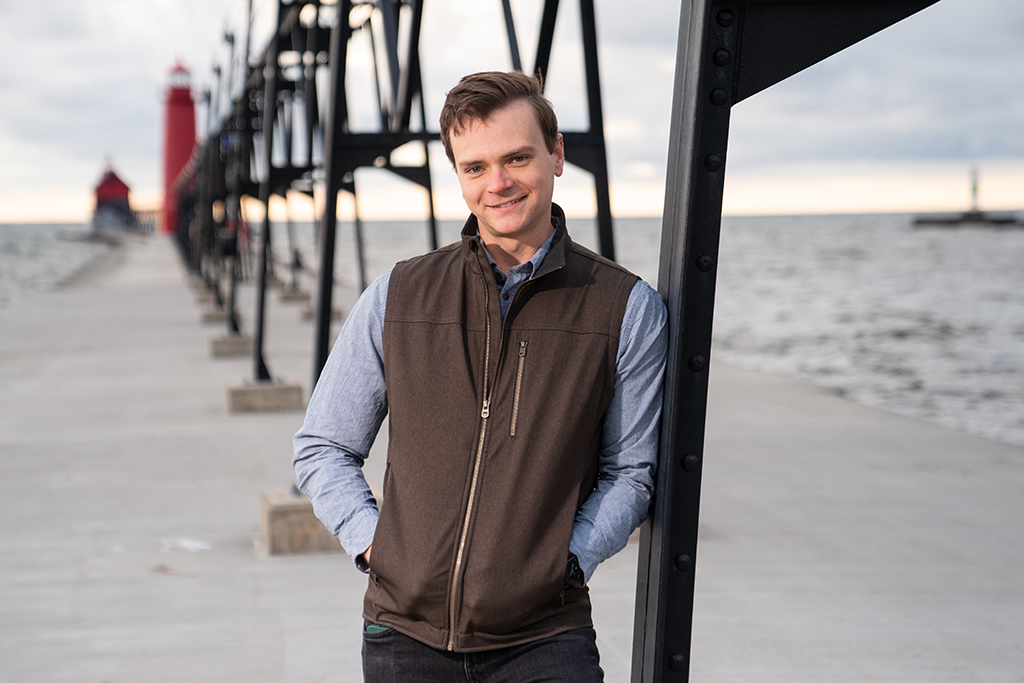
“I knew that Professor Coon had lots of industry relationships, and that he’d commercialized lots of technologies, which appealed to me as an entrepreneur,” he says. “It was also interesting to see how a group of 30 scientists works together, how Josh manages his vision, and how he thinks about raising and using capital.”
As it happens, Miller and two friends had started a company called Blockchain Analytics about a year earlier, in the summer of 2017. Though this venture involved building algorithms for trading cryptocurrency, not sorting and measuring ions, it was an experience that forged new business and technical skills, such as in web development. Both skills would prove helpful in future roles, including the Coon Lab.
For instance, as part of an ongoing appointment with the Coon group, Miller works on a product poised to revolutionize personalized medicine: the smart toilet. It analyzes metabolites in users’ urine, shedding light on their health and habits. Applications might include analyzing how a person metabolizes certain medications — which could influence dosing and ensuring patients receive the most appropriate medication — and monitoring how often someone takes their prescriptions, Miller says.
In addition to his work with the smart toilet, Miller works with tech, biotech, and pharmaceutical companies through his data science company founded in 2019, MadCity Analytics. This venture focuses on providing bio- and chemo-informatics services as well as developing and deploying machine learning models.
Miller’s job in Betterbin’s C-suite has a healthy dose of data science, too. The company helps consumers recycle more effectively by leveraging the power of data. According to Miller, Betterbin exists because recycling education is so messy.
“Lots of people assume that an item is recyclable when it’s not, or they recycle it the wrong way,” he says. “If they see the ‘recyclable’ logo (i.e., the three chasing arrows), they think it can go in the recycling bin, but that’s often not the case. One reason is that the recyclability of products varies by location in the U.S.”

To help people get accurate information about recycling at home and work, Betterbin offers a free smartphone app. Scanning an item’s barcode shows whether it can be recycled locally and if so, how.
As consumers get acquainted with the app, municipalities pay Betterbin to manage their recycling education programs. The company has clients on both coasts and in Wisconsin and Minnesota, according to Miller.
“We want to make things easier for municipalities, consumers, and brands,” he says.
Since the internet doesn’t have a robust product-packaging database, Betterbin is building one on the fly with help from machine learning tools. Part of the work involves multimodal dataset analysis, a skill Miller honed in Coon’s lab. In the Coon Lab, this meant integrating metabolite, protein, and genomic information; at Betterbin, it means integrating product image and text data.
If a consumer scans a product that’s not in the database, Betterbin’s software scours the internet for images and text descriptions of the product. The information he finds then gets classified using a detailed taxonomy.
“In my last job, taxonomy-building was a bridge between data science and biology; in this job, it’s a bridge between data science and consumer packaged goods,” he says.
Back to top
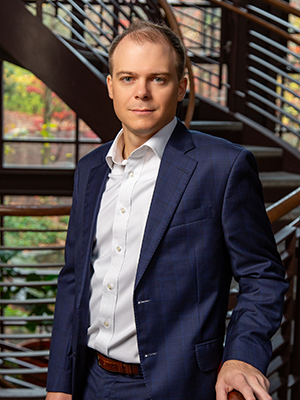
Location: Birmingham, Ala.
Position/Employer: Managing Director and Analytics Officer at Visante
Claim to Fame: Helping health systems solve complex problems by leveraging the power of strategic thinking and pharmacy analytics.
Proudest Moment: “The last few years at Visante are some of my proudest. Driving major change that allows clients to provide better health care services and continue to finance those services for their patients — there is nothing quite like it.”
Inspiration: “My wife. She sacrificed her job as a nurse practitioner so I could take my current job. I’m on the road a lot, so she decided to stay home with our two young kids. I could not do what I do without the support I receive from her and the kiddos.”
Jerame Hill (MS ’16) hit the ground running when he completed his combined master’s degree and pharmacy residency at the School of Pharmacy and UW Health. Armed with business acumen and an affinity for discovering new financial opportunities, he started post-graduation life as manager of the organization’s pharmacy supply chain team, became director of that team and the financial services unit within three years, and then joined the executive team at pharmacy consulting firm Visante in 2020.
“Consulting is exciting work that pushes me to learn constantly,” he says. “There’s always a new problem to solve, or a familiar problem in a different flavor, and I love helping clients transform health care through pharmacy.”
In addition to making Hill managing director, Visante acquired the company he co-founded with fellow Pharmacy Badger Joe Cesarz (PharmD ’10, MS ’12): Pharmacy Software and Analytics Solutions. Tools this company developed live on in Visante’s analytics division, highlighting opportunities for clients to reduce their costs and generate additional revenue.
“There’s always a new problem to solve, or a familiar problem in a different flavor, and I love helping clients transform health care through pharmacy.”
—Jerame Hill
“Our analytic tools are focused on providing clients with the information they need to ensure they are retaining their patients to allow them to provide the highest level of patient care,” Hill says. “Additionally, we are starting to focus on other areas in pharmacy to ensure that organizations are capturing revenue for the pharmaceuticals they provide. It is imperative that our clients be able to realize this revenue to continue to pursue their mission.”
Most of Visante’s clients are health care providers such as hospitals and health systems, and Hill’s contributions range from strategy-building to operational recommendations. Assessing a client’s financial performance is key, and it often involves reviewing extensive amounts of data, identifying opportunities to expand the use of internal pharmacy programs (such as specialty or infusion), and scrutinizing the pharmacy charge capture process. Along with finding opportunities for revenue generation and cost savings, Hill helps health care organizations optimize their business services, supply chain practices, 340B programs, revenue cycle, and infusion therapy programs, improving their financial well-being in the process. This is all made possible by Visante’s team of recognized pharmacy industry experts.
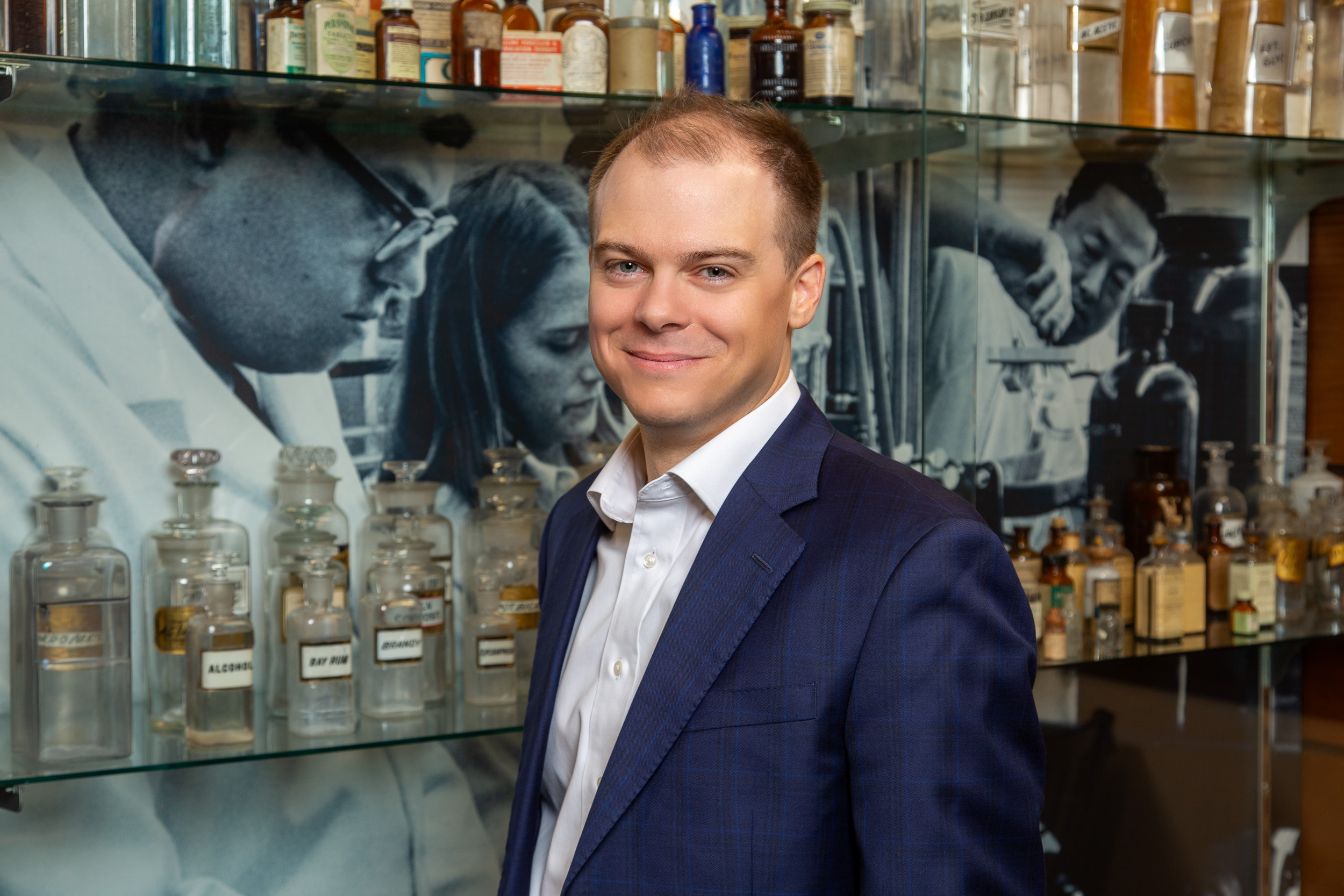
Hill also cultivates relationships with pharmacy leaders and C-suite executives at the organizations Visante serves, and oversees teams tasked with ensuring organizational success in all areas of pharmacy.
“I try to strike a good balance between being somewhat hands-on with the team and empowering them to make decisions on their own, in a way that drives change and meets our clients’ needs,” Hill says. “They are incredibly talented, and we all are constantly learning from one another. This is what drives positive outcomes for our clients.”
Some of the strategies Hill and his team create require ample knowledge about organizational change and the barriers that hinder it. These include ever-changing regulations, different payers having different rules and incentives, and new therapeutics that require special handling or may present unique financial considerations for an organization.
“As the complexity of delivering health care increases, so does the cost,” Hill notes. In other words, health systems need to invest their resources wisely and search for efficiency at every turn.
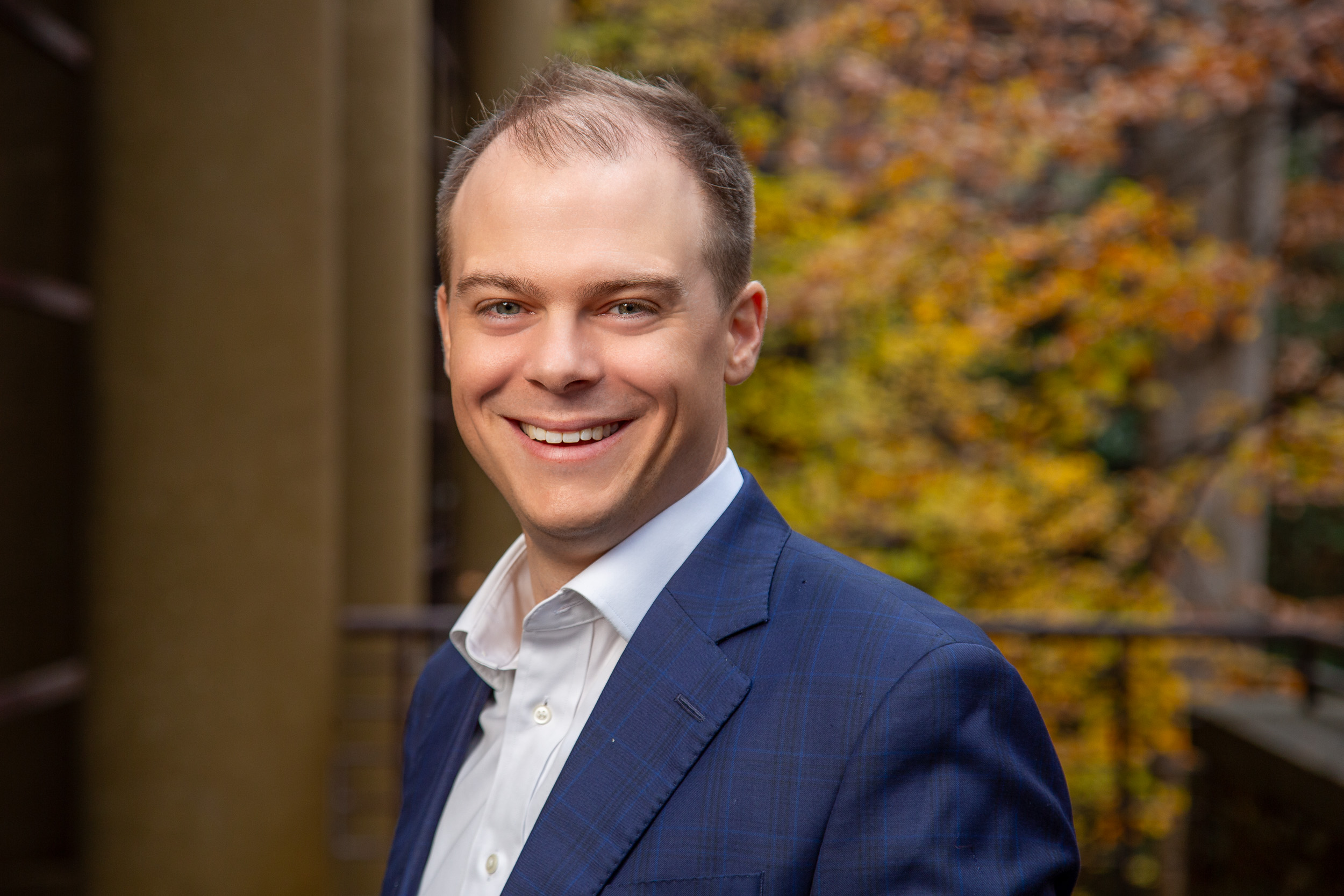
Hill learned this lesson firsthand at UW Health. It’s one reason he helped create its renowned consolidated pharmacy services center, which has brought tens of millions of dollars in annual savings to the organization.
“Putting disparate pharmacy operations in one place and running them more efficiently tends to produce better care for patients and lower costs for the organization, which means they can invest the money saved in the areas that need it most,” he says.
Hill’s desire to enhance patient care while lowering costs motivated him to lead many other projects at UW Health, too. One involved moving the pharmacy department to a new enterprise resource planning (ERP) software, which improved operations, efficiency, and the department’s analytics capabilities. Another involved developing a strategy to use the 340B program at UW Health’s Madison campus to gain more capacity to care for patients. Today Hill uses this experience to help other health systems optimize their 340B programs.
Though Hill is proud of the strategy itself, one of his favorite parts of the process involves people.
“I love being a leader, and in pharmacy administration, a key part of leadership is working with staff throughout an organization to get their buy-in for your vision,” he says. “Earning their support feels like a real achievement.”


